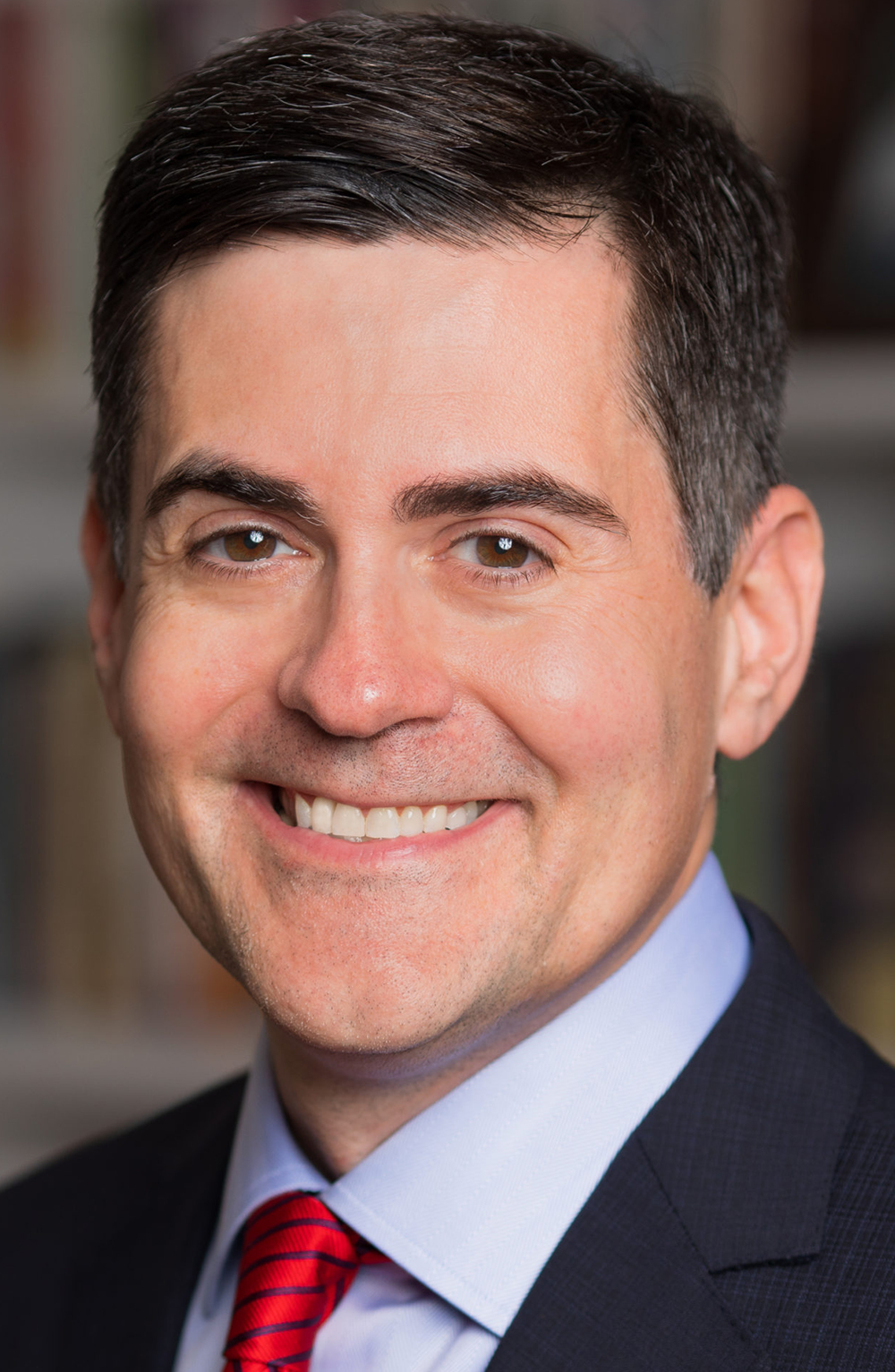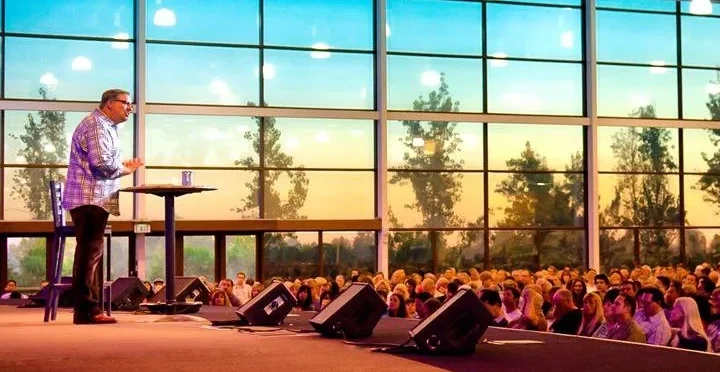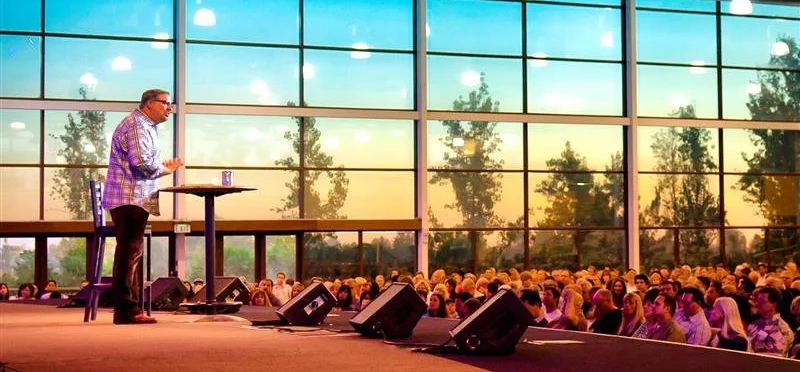The Great Commission is one of several scriptural reasons Rick Warren believes women are called by God to leadership in the church, he told Russell Moore in a March 8 podcast.
Warren, recently retired pastor of Saddleback Church in Southern California, appeared on “The Russell Moore Show” with Moore, a former Southern Baptist who now serves as editor in chief of Christianity Today. In February, the Southern Baptist Convention’s Executive Committee voted to expel Saddleback Church — the denomination’s largest congregation — because they ordained three women and now have a female among the rotation of teaching pastors. That decision could be appealed at the SBC annual meeting in June, and Warren said he’s likely going to appeal it.
Moore got pushed out as head of the SBC’s Ethics and Religious Liberty Commission by far-right critics who accused the conservative theologian of being “woke” and too hard on former U.S. President Donald Trump.

Rick Warren addresses messengers to the SBC annual meeting. (Photo courtesy of The Baptist Paper)
Warren quipped that he’s “ready here to join in the former Southern Baptist support group with Beth Moore, with Russell Moore and a few others.” Bible teacher Beth Moore, no relation to Russell Moore, also left the SBC two years ago and was criticized by conservatives for “preaching” and not just “teaching.”
Moore said he was “kind of bowled over” by the Executive Committee’s action “just because I would think with all of the crises involving the treatment of women and sexual abuse within the SBC, that saying a church is giving women too much is really not the problem in the SBC as I see it. And I couldn’t believe that’s what they were taking up.”
Warren responded: “It’s not an accident that the same voices that said we cannot protect women from abuse because of the autonomy of the local church are the same voices that are saying, but we can prevent them from being called pastors. … The autonomy only matters if it’s convenient for you.”
For the SBC to say it can’t address sexual abuse but can monitor the titles given church staff members is “nonsense,” he said.
Baptist Faith and Message
Moore asked Warren about the SBC’s doctrinal statement, the Baptist Faith and Message, which says the office of pastor is to be held by “men qualified by Scripture.”
“This is not a battle between liberals and conservatives. All the liberals left a long time ago.”
Warren responded with a history lesson: “Southern Baptists have always been anti-creedal. I grew up with the phrase, ‘We have no creed but Christ, we have no book but the Bible.’ This is not a battle between liberals and conservatives. All the liberals left a long time ago. Everybody in the SBC believes in the inerrancy of scripture. Now we’re talking about difference of interpretation. Those particular passages from Titus, Timothy and Corinthians have hundreds, literally hundreds of interpretations. We should be able to expel people over sin, racism, sexual abuse, other sexual sins, things like that.”
Warren offered a mock query: “You mean, wait a minute, we can disagree over the atonement. We can disagree over election. And we can disagree over dispensationalism. We can disagree over the second coming. We can disagree over the nature of sin. But we can’t disagree over what you name your staff?”

Russell Moore
Later, Warren said: “In the Baptist Faith Message, it says this is not binding on anybody. It says it in the preamble: This is not binding on any church.”
The modern-day fundamentalists of the SBC are “turning a confession into a creed,” Warren said. “And we’re weaponizing it. We’re starting an inquisition. And if this now falls into place, any pastor each week can stand up and say, ‘I want to kick out that church because they disagree on dispensationalism.’ We should kick out churches for sin. We should kick out churches that harm the testimony of the convention. This isn’t harming the testimony of anybody.”
Even though the so-called “liberals” left the SBC more than two decades ago, “this is the same old battle that’s been going on for a hundred years in the SBC between conservative Baptists and fundamental Baptist,” Warren declared. “Now, ‘fundamentalism’ is a word that has changed. A hundred years ago, I would’ve called myself a fundamentalist, because in the 1920s, it meant you hold the historic doctrines of the church, the blood atonement of Christ, the authority of Scripture, all the basic cardinal doctrines of evangelical Protestantism.
“But that word has changed because now we have fundamental Muslims, fundamental Buddhists. We have fundamental atheists, we have fundamental communists, we have fundamentalists who are secularists. Today, a fundamentalist means you’ve stopped listening. It means you’ve stopped listening.”
“A conservative Baptist believes in the inerrancy of Scripture; a fundamentalist Baptist believes in inerrancy of their interpretation.”
He declared: “I believe in the inerrancy of Scripture, I do not believe in the inerrancy of your interpretation, nor of mine for that matter. Which is why I have to say I could be wrong. We have to approach Scripture humbly saying, ‘I could be wrong.’ You’ll never hear a fundamentalist say, ‘I could be wrong.’ A conservative Baptist believes in the inerrancy of Scripture; a fundamentalist Baptist believes in inerrancy of their interpretation. That’s a big difference.”
Changed view on women
On the issue of women in ministry, Warren said he understands Saddleback’s critics because he used to hold the same view as them.
“I believed the way they did until three years ago. And I actually had to change because of Scripture. Culture could not change me on this issue. Anecdotes could not change beyond this issue. Pressure from other people would not change me on this issue.”
During the pandemic, he said, he undertook an extensive study of the Great Commission and church history. He wanted to know why the church grew fastest in its first 300 years.
“We went from 120 people in the Upper Room to becoming the official religion of the Roman Empire in 300 years,” Warren noted. “The church grew about 50% a decade for the first 300 years.”
The early church “had no pulpits” and had no idea “that one guy would stand behind a pulpit and preach,” he continued. “That wasn’t New Testament worship. Paul says everybody has a song, everybody has a Scripture, everybody has a teaching. It was in a house, and everybody shared it.”
This study “caused me to change my view about women,” Warren said. “Nothing else could have.”
Great Commission for all
He outlined a scriptural basis for women in church leadership beginning with the Great Commission. Baptists “claim we believe the Great Commission is for everybody, both men and women are to fulfill the Great Commission. Well, not really. You don’t believe that because it says there are four verbs in the Great Commission. Go, make disciples, baptize, and teach. Women are to go. Women are to make disciples. Women are to baptize. And women are to teach, not just men.”
“Saddleback has baptized more people than any church in American history — 57,000 adult baptisms in 43 years.”
Saddleback already acknowledged this truth as evidenced in its baptismal practices, he said, and “Saddleback has baptized more people than any church in American history — 57,000 adult baptisms in 43 years.
“Why? Because in our church, if you win them to Christ, you get to baptize them. So if a mom wants to baptize her child, or a wife wants to baptize her husband that she led to Christ, anybody can baptize anybody. … It’s the liberation, the emancipation of every member as a minister.”
Among those four verbs in the Great Commission, “You can’t say, well, the first two are for men and women. The last two are only for men. Or maybe just ordained men.”
He continued: “Who authorized women to teach? Jesus. ‘All authority is given to me. Therefore teach. All authority is given to me. Therefore, baptize.’”
“I had to repent when I actually looked at the Great Commission,” Warren said. “I had to say, it’s not just for ordained men, it’s for everybody.”
Pentecost
The second thing that changed Warren’s mind was the biblical account of the Day of Pentecost.
“On that day at Pentecost, we know women were in the Upper Room. We know women were filled with the Holy Spirit,” he said. “We know women were preaching in languages other people couldn’t hear, to a mixed audience. … It wasn’t just men. Women were preaching on the Day of Pentecost.
“How do we know that? Because Peter felt obligated to explain it. And so in Acts chapter two verses 17 and 18, he goes, ‘Hey guys, these people aren’t drunk. What you’re seeing was foretold by Joel. It was going to happen.’ And he explains why you’re now seeing women preaching on the very first day of the church. He explains it and he says this is what Joel predicted. … Peter says, in the last days, I will pour out my Spirit on all flesh. All flesh. Your sons and daughters will prophesy.”
From the Day of Pentecost, “in the church, everybody gets to play,” he said. “Everybody gets to preach. Everybody gets to prophesy. And the people who don’t like that ignore that verse. John MacArthur doesn’t even cover that verse. He just skips over it.”
The resurrection
The third thing that changed his mind, Warren said, is “the very first sermon, the very first Christian sermon, the message of the gospel of good news of the resurrection. Jesus chose a woman to deliver it to men. He had Mary Magdalene go and tell the disciples. Now that clearly wasn’t an accident. It was intentional, it’s a whole new world, baby. Now he has a woman go tell the apostles.”
Moore asked Warren if he now would support both men and women serving as elders or senior pastors or in any other role in the church.
“For 2,000 years, the church has debated the role of women in culture. But to make it a litmus test for are you a Baptist or not, is nonsense.”
“I would, I would, I would, but here’s what I’d say: … This is my interpretation. I have to say with humility, it doesn’t bother me if you disagree with me. For 2,000 years, the church has debated the role of women in culture. But to make it a litmus test for are you a Baptist or not, is nonsense.”
Standing up for others
There’s also a racial element to the question of Baptist women in ministry, Warren said.
“For hundreds of years, Black Baptist churches have been ordaining women as bishops, as pastors, as prophets, as apostles as elders, as deaconesses. If this is true, the SBC is holding up a sign that says, ‘All Black churches look elsewhere.’”
Warren said he’s already received 300 letters “written to me by scared pastors going, ‘If they find out we’ve ordained women in our church, will we get kicked out too?’ And they’re scared to death.”
Warren said he’s fighting for those pastors and churches. “If all this hurt was Saddleback, I’d just walk away from it. But … I’m concerned about, now convinced, we’ll never fulfill the Great Commission with half the church sitting on the bench. I believe the Great Commission was given to everybody. Everybody’s to go, everybody’s to make disciples, everybody’s to baptize and everybody’s to teach. That’s what the Great Commission says. And Jesus authorized men and women to do it.”
For these reasons, Warren said he likely won’t walk away from a fight with his critics at the SBC annual meeting in June.
“In my heart of hearts, I just want to walk away from it. You don’t want to be where you’re not wanted. … I think that’s a selfish thing to do. I think I need to stand up for the pastors who are scared to death by this inquisition. And I think I need to stand up for the millions of godly Southern Baptist women whose gifts and leadership skills are being stymied.”
Related articles:
Southern Baptist Convention ousts its largest church, Saddleback, for having a woman pastor
Largest church in SBC ordains three women as pastors
As church staff roles evolve, the SBC is forced to define the word ‘pastor’


